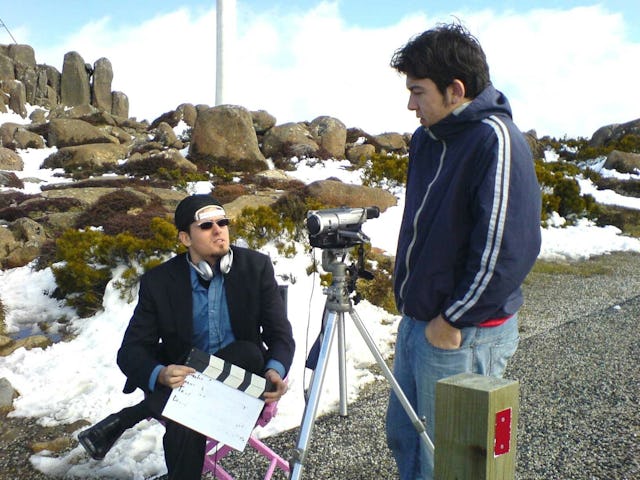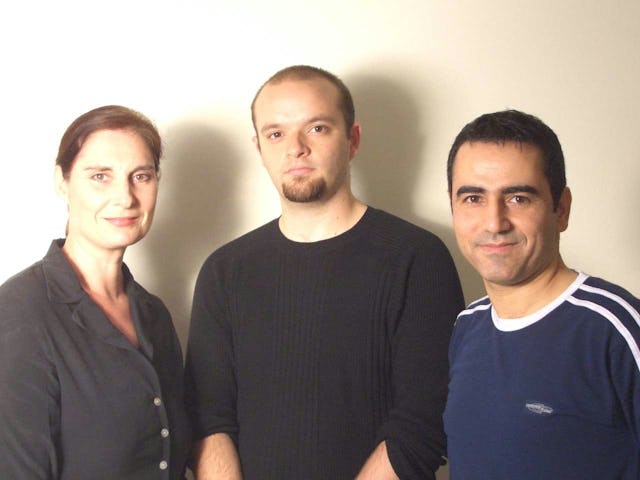Women scoop awards at film festival
SYDNEY, Australia — A movie from a child's perspective about the equality of the sexes won the "best film" award at the Baha'i-inspired "Harmony Film Festival" held in Australia's biggest city on 22 October 2005.
The Australian-made movie by Bita Haidarian, a Los Angeles-based filmmaker, tells the story of an eight-year-old girl whose father refuses to let her to swap her household chore (dishwashing) with her brother's (lawn mowing) because mowing is "for boys."
The girl takes matters into her own hands and ends up with a humorous and telling result.
More than 600 people attended the festival, which had "woman" as its theme. Entries came from 25 filmmakers of diverse religious and cultural backgrounds and from countries including Australia, Japan, Spain, Russia, and the United States.
The films ranged from a gentle coming of age exploration ("32EE") and broad-based slapstick comedy ("Footsteps Femme Fatale") to documentaries about genocide in Sierra Leone ("Mussu") and female alienation in Russia ("The Glass Island").
The judges were from the film industry. They included documentary filmmakers Peter Butt and Mitzi Goldman, movie director Mojgan Khadem, film and television journalist Sandy George, and actor Nick Tate.
Eight of the 14 finalists were female directors, a gratifying result according to festival director Mehrzad Mumtahan.
"We chose 'woman' as the 2005 theme to draw attention to the issue of equality and the important role women can play as peacemakers in our troubled world," Mr. Mumtahan said.
"To have the majority of the finalists be female is an incredibly positive result. It shows that we're not just about words and platitudes -- but really making a difference."
Mr. Mumtahan said the festival was inspired by the Baha'i belief that the arts have a great capacity to awaken and uplift the heart. He said filmmakers can proclaim widely the message of peace, and encourage people to discuss vital issues relating to harmony and unity.
Entrants in the festival were advised that a useful starting point in their exploration of the 2005 theme was "The Promise of World Peace," a message issued in 1985 by the Universal House of Justice that highlighted an important relationship between the role of women and the establishment of world peace.
"The emancipation of women, the achievement of full equality between the sexes, is one of the most important, though less acknowledged prerequisites of peace," the message said.
"The denial of such equality perpetrates an injustice against one half of the world's population and promotes in men harmful attitudes and habits that are carried from the family to the workplace, to political life, and ultimately to international relations," it said.
(For more of the statement, see http://reference.bahai.org/en/t/uhj/PWP )
Shideh Faramand's six minute comedy "In Time" won both the "audience choice" and "achievement" awards. The film takes a humorous look at the social pressures on single women to get married and start a family.
Ms. Faramand said her inspiration in filmmaking was to "make an impact on the world."
"They say the soul of society can be seen through the arts and we can see that its moral stance is so degrading. I would like to create its new soul," she said.
The award for the "most original concept" went to Anis Fanaeian for his film "Remember Tomorrow," a film about a successful professional woman who chooses motherhood and the joy of having and raising children over a successful career.
One of the judges, documentary filmmaker Peter Butt, said the Harmony Film Festival is building a new paradigm for the film industry, providing a new platform for filmmakers to share with the world their hopes and dreams of a new civilization.
"You're talking to the grassroots and you're inspiring people to roll out new ideas to impact upon society," Mr. Butt said.
"It may not be from tonight that there's a big change, but it's the practitioners (filmmakers) that have the greatest impact."
The festival, now in its second year, was organized by a three-person team comprising Collis Ta'eed, Naomi Hall, and Mr. Mumtahan.
The festival films have already been seen in other Australian cities, in New Zealand, and in Israel, and will soon be screened in other countries.
For more information on the festival see http://www.harmonyfilmfest.com
(Reporting by Farnaz Fanaian and Sabour Bradley.)

